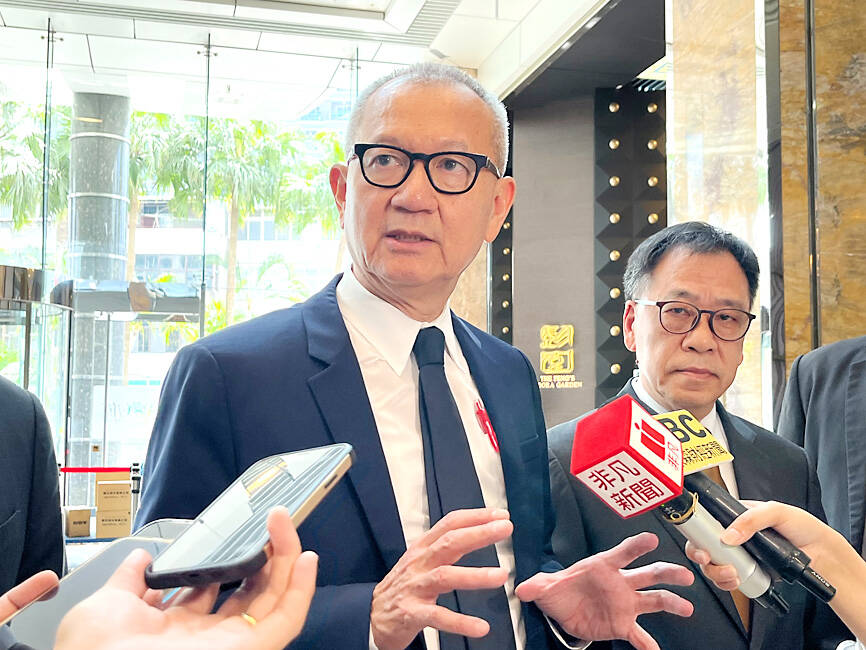Yageo Corp (國巨), the world’s third-largest multilayer ceramic capacitor supplier, said that it had acquired France-based Schneider Electric’s sensor business in a deal worth about 723 million euros (US$788.26 million).
The acquisition of Telemecanique Sensors early this month matched Yageo’s shift in strategy to offer premium products, the company said in a statement on Tuesday.
Yageo expects the deal to broaden its product portfolio and raise its gross margin substantially next year, given that Telemecanique Sensors focuses on making higher-margin chips for industrial devices, the company told investors during an online conference on Oct. 26.

Photo: CNA
Yageo’s gross margin fell to 33.2 percent last quarter from 38.5 percent a year earlier, as weak demand resulted in lower factory utilization.
However, the company said it remained on target to boost gross margin to 40 percent in the long term.
Telemecanique Sensors — a leading global specialist in the design, development and delivery of mission-critical electromechanical and electronic sensors — registered a compound annual growth rate of 5.5 percent in revenue over the past three years, with annual revenue averaging US$330 million, the statement said.
North America and Europe are its biggest markets, contributing about 70 percent to Telemecanique Sensors’ revenue, Yageo said.
Telemecanique Sensors operates five manufacturing sites in France, Indonesia, Mexico and the US, it said.
Yageo said it is still grappling with a severe inventory correction cycle, which has depressed customer demand, adding that it would take another one or two quarters for customers to deplete excess inventory before needing to restock.
Unlike previous downcycles, it is taking longer than expected for customers to digest inventory, as sluggish demand from the Chinese market has compounded already unhealthy inventory levels and weak end-demand in the post-COVID-19 period, Yageo said.
Yageo CEO David Wang (王淡如) said this quarter and next quarter would mark the trough for the firm.
Revenue this quarter would contract about 5 percent sequentially, Wang said.
In the best-case scenario, next quarter’s revenue could reach a similar level to this quarter, he said, adding that the forecast did not factor in benefits from acquiring Telemecanique Sensors.
Overall, Yageo saw its book-to-bill ratio improve to about 1 this quarter, he said.
The improvement was more evident in its commodity products, which had seen the book-to-bill ratio drop below 1 due to sagging demand, he said.
Demand for high-end products has been stable, he added.
Demand from the computer segment, which includes notebook and desktop computers, smartphone and telecom-related devices, continued to diminish this quarter, Yageo executive vice president of global sales and marketing Claudio Lollini, said.
However, demand for components used in servers, vehicles, and industrial and medical devices is increasing, Lollini said.
Gross margin would be flat this quarter on a sequential basis, while utilization would also be the same as last quarter, with equipment usage for premium products remaining at about 70 percent, Wang said.

Application-specific integrated circuit designer Faraday Technology Corp (智原) yesterday said that although revenue this quarter would decline 30 percent from last quarter, it retained its full-year forecast of revenue growth of 100 percent. The company attributed the quarterly drop to a slowdown in customers’ production of chips using Faraday’s advanced packaging technology. The company is still confident about its revenue growth this year, given its strong “design-win” — or the projects it won to help customers design their chips, Faraday president Steve Wang (王國雍) told an online earnings conference. “The design-win this year is better than we expected. We believe we will win

Intel Corp chief executive officer Lip-Bu Tan (陳立武) is expected to meet with Taiwanese suppliers next month in conjunction with the opening of the Computex Taipei trade show, supply chain sources said on Monday. The visit, the first for Tan to Taiwan since assuming his new post last month, would be aimed at enhancing Intel’s ties with suppliers in Taiwan as he attempts to help turn around the struggling US chipmaker, the sources said. Tan is to hold a banquet to celebrate Intel’s 40-year presence in Taiwan before Computex opens on May 20 and invite dozens of Taiwanese suppliers to exchange views

Chizuko Kimura has become the first female sushi chef in the world to win a Michelin star, fulfilling a promise she made to her dying husband to continue his legacy. The 54-year-old Japanese chef regained the Michelin star her late husband, Shunei Kimura, won three years ago for their Sushi Shunei restaurant in Paris. For Shunei Kimura, the star was a dream come true. However, the joy was short-lived. He died from cancer just three months later in June 2022. He was 65. The following year, the restaurant in the heart of Montmartre lost its star rating. Chizuko Kimura insisted that the new star is still down

While China’s leaders use their economic and political might to fight US President Donald Trump’s trade war “to the end,” its army of social media soldiers are embarking on a more humorous campaign online. Trump’s tariff blitz has seen Washington and Beijing impose eye-watering duties on imports from the other, fanning a standoff between the economic superpowers that has sparked global recession fears and sent markets into a tailspin. Trump says his policy is a response to years of being “ripped off” by other countries and aims to bring manufacturing to the US, forcing companies to employ US workers. However, China’s online warriors